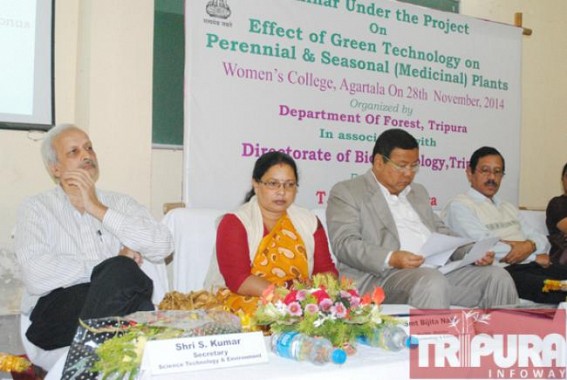TIWN

AGARTALA, November 28 (TIWN): A one day seminar on the effect of green technology on seasonal and perennial (medicinal) plants was organized by the department of forest, Tripura in association with the Directorate of biotechnology Tripura with the funding of TFDPC at women’s college, here today.
While addressing in the seminar Minister for Science, Technology and Environment Bijita Nath said that the growing concern about the adverse effects of application of chemicals in the agriculture practices has compelled us to restore the environment for sustainable production that encourages the introduction of organic inputs in a comprehensive form of Biotech kit The process offers immense scope to small and marginal farmers and SHG groups in creating their own organic environment and project their farming land as a “hub of safe food production” It is considered necessary to promote and take this technologies to the door step of the farmers in every corner of the state for improvement of soil heath and to create a hazard free sustainable environment. The “Biotech Kit” consist of 18 different bioinputs including Micorhizal preparation N,P,K,S fixing biofertilizer, entomopathogenic biopesticides, neem & garlic based biopestisides, beneficial fungas to restrain plant diseases, lure to trap the pest and a sprayer. This Directorate has all ready completed the distribution of Biotech kin among the 80 nos of small and Marginal farmers of Lakhsminagar & Saraspur GP under Kadamtala Block, Gamchakobra ADC Village under Lefunga Block, South Narayan pur Village under erstwhile Mohanpur (now Bamutia) Block during 2013 – 14. The same programme will be followed in the 2014 -15 financial year, minister said.
The Directorate of Biotechnology has given priority to reduce the use of chemical input in agriculture & to produce safe food and to conserve biodiversity and to reduce environmental pollution in the state. Keeping in view use of Biotech Kit has been developed for the small and marginal farmers and perhaps for the first time in the Eastern India, the minister added. The Green Revolution (a term used for rapid increases in wheat and rice yields in developing countries brought about by improved varieties combined with the expanded use of fertilizers and other chemical inputs) has had a dramatic impact on incomes and food supplies in many developing countries.
However, the impact goes far beyond these immediate and very important results. The Green Revolution has facilitated institutional and social changes in rural areas and provided opportunities for self-sustaining economic growth and reduced poverty.
The final outcome of technological change is influenced by the institutional and policy environments within which it is introduced. Where such environments have been favorable, the distribution of the benefits has been widespread, but where they have been unfavorable and appropriate changes have not been made, the potential benefits from the Green Revolution to promote economic growth, reduce poverty and facilitate self-sustaining def/clopment have not been fully exploited. The importance of the interaction between the Green Revolution and the illstitulional and policy environments has been recognized in much of the debate about the impact of the Green Revolution, the minister mentioned.
Principal Chief Conservator of forest, S. Talukdar, Director of biotechnology SK Paul and other officials were present in the workshop.
- 'Intolerable.....' Corporators Lodged FIR against Madhabi Biswas over 'Insane Video' on social media targeting PM & Mayor
- Blood Donation Camp Organized in Sipahijala District
- Yuvrajnagar Panchayat Samiti Chairperson's Husband Denies Molestation Allegations
- CPIM Submits Memorandum for Fair Voter List Revision
- 23 Panchayats in Gauranagar Block Receive Computers, Printers, and LED TVs



